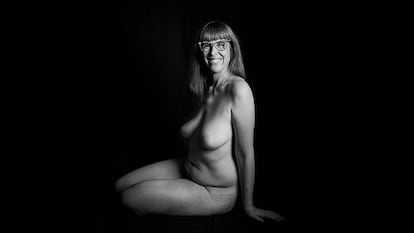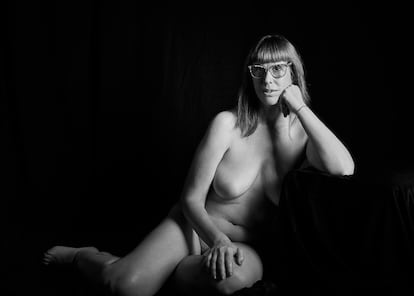Valeria Schapira: ‘I say goodbye to everything that bothers me, that takes away space or freedom’
The Argentine writer and journalist talks to EL PAÍS about the death of her parents, breaking the mold and why she wanted to do a nude photo shoot at the age of 52

Argentine writer Valeria Schapira has just come back from the gym and is preparing mate. It’s 11.30am in Buenos Aires, 4.30pm in Madrid. This year she turns 52 and to celebrate she has decided to do a nude photo shoot. Another one. Posing in the nude is nothing new for this journalist, TV presenter, radio host and creator of the #ViajoSola (or, I travel alone) movement, but this year, she has asked for all her imperfections to be on show. In the manifesto accompanying the images, taken by photographer Germán Romani, Schapira writes: “I have done beautiful nude photos several times, with quite a bit of retouching. Where little was seen of my imperfections. Here are these imperfections, which are part of who I am. Like my age. Like my evolution. Like this woman that I am.” A woman who is 52, visible, and right where she wants to be.
Question. The visibility of women over the age of 50 is an issue you address in your latest book, Hola 50 (or, Hello, 50).
Answer. Here in Argentina, and in Europe, women of a certain age are not represented. Even in feminism, – and this is just an observation – the struggles are very focused on issues such as abortion, but we ourselves have been left out. Middle-aged women have been left out of representation on issues such as work, the physical.
Q. As we get older, we start to be erased.
A. That’s right. But I’m 52 years old and I feel like I’m 30 and I travel and fall in love like I did when I was 30. I remember my mother as a lady with a bun and a little suit.
Q. It was another generation, another way of being in the world.
A. But it keeps happening. Now suddenly a 35- or 40-year-old woman writes to me and tells me: “I’m following in your footsteps, I’m going to start traveling alone.” And I think: but weren’t you already doing it? We are moving forward, but there are still things that are hard for us to do.
Q. What was the hardest thing Valeria faced in her twenties? How did she get here?
A. I always did what I wanted, I always knew I was going to be a writer, I always knew I wanted to be a journalist. I have lived in Buenos Aires for 20 years, but I grew up in Rosario. I got a scholarship at 24 to study in Britain, but when I came back, well, I no longer had parents. I am saying this because everything is part of who I am today. I have spoken about it many times, especially on the issue of mental health. My mother committed suicide and my father died a few months before her from leukemia. There was no longer a mother or father or anyone to tell me that I had to settle down or how to do it.

Q. What happened when you returned to Rosario?
A. I turn into a girlfriend because it was weird not having a boyfriend at 27 years old. I get married. And now I see it like this: I got married at 30 because I felt old and I separated at 34 because I was too young to be married. Today I have that picture of me in my wedding dress and I remember looking for a bouquet of flowers with my mother-in-law and it’s like I’m seeing a stranger. I think about that and about how a woman can think she is not all that she can be because she does not have a husband. I felt that way at that moment, and women of my generation still tell me: “Well at least you got married.”
Q. The validation.
A. It’s like a guarantee certificate: I declare you valid for having had a man called a husband. Good thing we didn’t have things to split back then.
Q. Or children.
A. Or children. And no interest in having them. Which was another monstrosity for the time.
Q. Have you ever wished you had done something differently?
A. No. I don’t have regrets, but I started leaving things behind. I decided to come to Buenos Aires. More things happened and I went to travel the world and when I was approaching 50, my dog died and I snapped again. Every now and then I have a crisis and I slam the door, change something, travel or move to another city or leave the country. I say crisis in the most optimistic sense of the term. They usually accompany my personal changes, my professional changes too.
Q. And now?
A. I keep doing a little of everything, more so the closer I get to old age. I say this because I was criticized a lot for the back cover of the book [Hello, 50]. I wrote something like that after middle age, you begin to see the horizon, the finitude, and they jumped at me saying what was that, that if we are all going to die. Well look, yes, we are all going to die. So I have the present in my head, I have it in everyday life. I always try to do what I want to do because I don’t know if I’ll be able to do it tomorrow.
Q. Your book also talks about letting go.
R. Yes, to keep moving, traveling. And letting go; not being attached to things. I have been practicing it for a long time, especially in the material, objects get in the way. I have had to move out of so many houses throughout my life that it becomes easier. I’ve gotten rid of half my library and my wardrobe. I don’t need so many things. Now I am trying to transfer that to all areas of my life, to everything that is left over, that bothers me, takes away space or freedom, I say goodbye to it.
Q. And to people?
R. I don’t know how to answer that... I’ve always lost so many people that I think I have detachment built into me. Four years ago, my dog [a golden retriever named Joy] died, and I keep crying every day. And there are two people in my life, and I know that if they were not around, I wouldn’t be able to keep going, even though I have always moved forward. As for the rest, I am willing to leave the country or whatever. Everything is transitory.
Q. What do you reflect most upon now?
A. Every minute of my life, what I am aware of is the issue of death. But from a good place. I learned to naturalize death as part of the cycle of life. I mean, if I died, everything would be okay. This has led me to take or leave jobs and have more freedom. For example, if I had had a permanent job right now in Argentina I wouldn’t have ended up last month in a humanitarian air corridor from Poland to Madrid [the flights that filmmaker and Argentine pilot Enrique Piñeyro chartered a few weeks ago to take Ukrainian refugees to reception centers in Madrid and Barcelona].
En una de las escalas del corredor humanitario de la ONG Solidaire y @openarms_fund a las que se sumaron @FCBarcelona_es y muchas ONG @epineyro_ok relata el objetivo de esta y otras misiones de rescate de refugiados y personas vulnerables. pic.twitter.com/XAt3dZ5qMs
— Valeria Schapira (@valeriaschapira) March 14, 2022
A Twitter message from Valeria Schapira during a stopover on a flight to take Ukrainian refugees from Poland to Madrid.
Q. Does this perspective give you greater clarity about your goals: what you want and don’t want? What is your list?
A. Yes, I am very clear on them. I have health [on my list] and that for me is on the podium. Then I am a millionaire in friends, I have a wonderful family of friends, they are my network, my support and I have love and passion for my profession.
Q. Do you think that the world today has prepared people to identify these areas, which then over time become the real priorities?
A. No, no, no, there is no emotional or financial education. There is no economic or emotional empowerment for women. And the two are closely related. Sometimes I look around me and I don’t understand the priorities of others.
Q. What do you mean?
A. I live in a country in absolute crisis, where practically one out of every two Argentines is poor. And what I see around me, without going into the finances of each person – which is something very personal – but I see people who spend, in the best of cases, 15 hours a day working with a boss who mistreats them in order to buy the latest car model or to spend the weekend in a mall and buy clothes that you have nowhere to wear or to have the latest cellphone model.
Q. Capitalism.
A. We have to change the paradigm. I prefer to have the freedom of today, where at 3pm I can have a mate in a square if I need it. I can do this because there was a moment in my life when I had to choose. And I have worked and continue to work a lot. The year I lost my parents, I just wanted to cry, I had to swallow my emotions because I had a work schedule to keep.
Q. And how do you want the world to be?
R. We need more connection, with others, with what surrounds us. And care. To look around and see people. We can’t walk down the street, see a person lying on the floor and walk over them.
Tu suscripción se está usando en otro dispositivo
¿Quieres añadir otro usuario a tu suscripción?
Si continúas leyendo en este dispositivo, no se podrá leer en el otro.
FlechaTu suscripción se está usando en otro dispositivo y solo puedes acceder a EL PAÍS desde un dispositivo a la vez.
Si quieres compartir tu cuenta, cambia tu suscripción a la modalidad Premium, así podrás añadir otro usuario. Cada uno accederá con su propia cuenta de email, lo que os permitirá personalizar vuestra experiencia en EL PAÍS.
¿Tienes una suscripción de empresa? Accede aquí para contratar más cuentas.
En el caso de no saber quién está usando tu cuenta, te recomendamos cambiar tu contraseña aquí.
Si decides continuar compartiendo tu cuenta, este mensaje se mostrará en tu dispositivo y en el de la otra persona que está usando tu cuenta de forma indefinida, afectando a tu experiencia de lectura. Puedes consultar aquí los términos y condiciones de la suscripción digital.









































